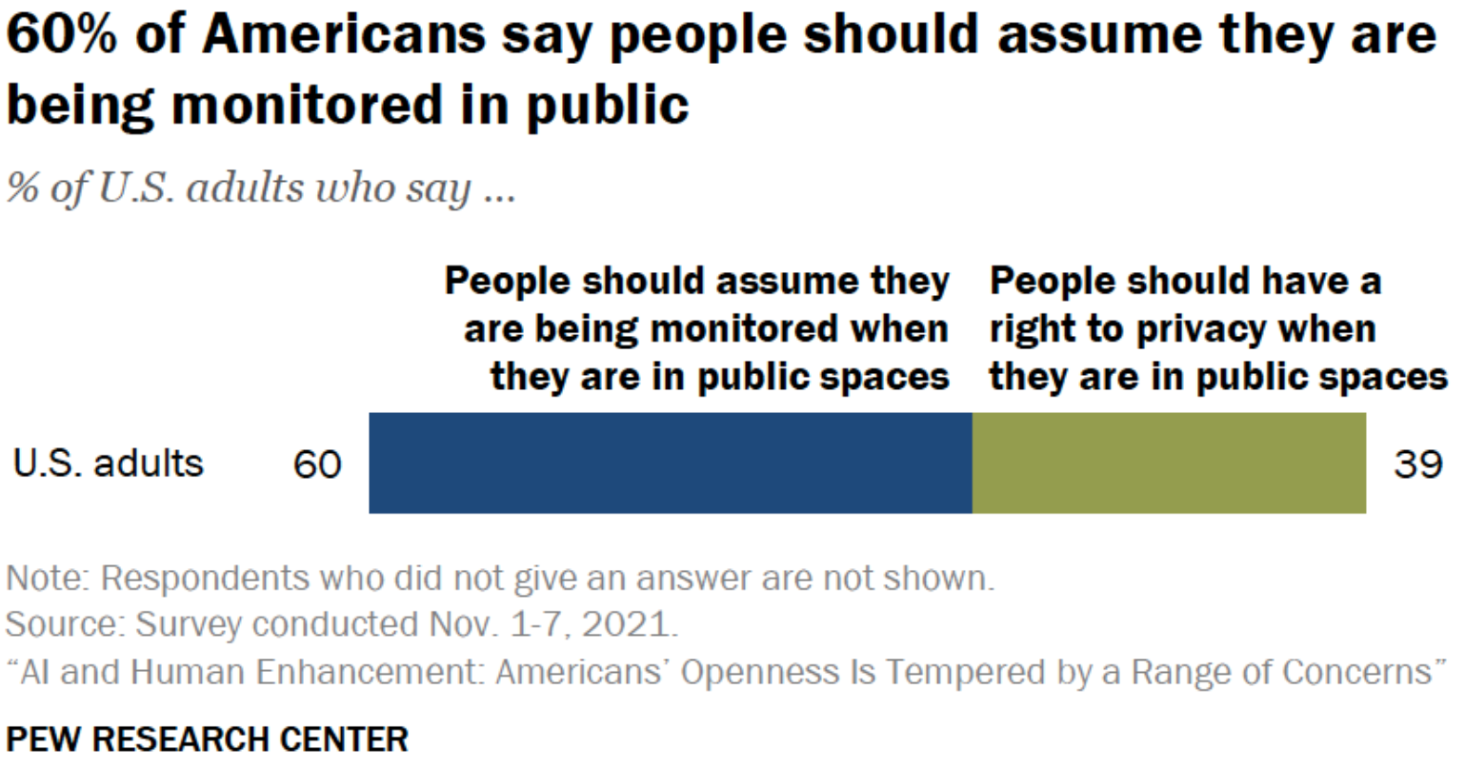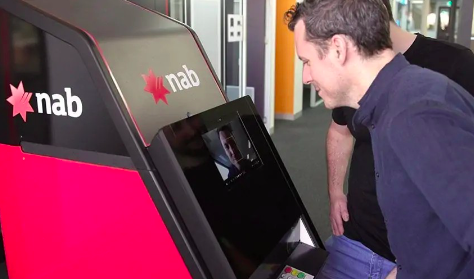Facial Recognition
Facial recognition takes an image and uses facial features within that image to identify the faces of humans. Simple forms of this existed all the way back in the 1960s. Since then, facial recognition technology has advanced enough to have many unique applications such as unlocking your phone or assisting police in solving crimes. While this technology can be used in positive ways, it can also be used to do harm through invasion of people’s privacy, wrongful arrests, or even surveilling certain neighborhoods more than others.
What are people’s beliefs on the effectiveness of facial recognition technology on crime rates if it’s widely used by the police?
According to our findings, 52% of people within the age group 12-24 said that crime rate would decrease with the use of facial recognition technology. 27% said that it would increase and 21% said it would stay the same.
This is compared to American adults in which 57% of people claimed it would stay the same, 8% of adults claimed it would increase, and 33% of adults said it would decrease.
Should people assume that they are being monitored when they are in public spaces?
According to our findings, 81% of people within the age group 12-24 said that you should assume that you’re being monitored when you’re in public and 19% said that you should assume you have privacy in public.
This is compared to American adults in which 60% said you should assume you are being watched and 39% said you should have a right to privacy.
Will the use of facial recognition technology by police lead to the invasion of other’s privacy?
According to our information, 2% of people within the age group 12-24 believe that the police definitely will not invade our privacy, 27% believe that the police probably will not invade our privacy, 58% believe that the police will probably invade our privacy, and 13% said that the police will definitely invade our privacy.
Will the use of facial recognition tech be used to monitor Black and Hispanic neighborhoods more than others?
According to our information, 2% (3-4) of people within the age group 12-24 said that it somewhat unlikely police’s use of facial recognition technology would cause them to monitor Black and Hispanic neighborhoods more often than other neighborhoods, 42% (5-7) said it was somewhat likely that police might use it to monitor those neighborhoods more, and 56% (8-10) of people said it was very likely that police would use it to monitor Black and Hispanics neighborhoods more often.
According to American adults, 32% of people said that the use of technology would not monitor black and hispanic neighborhoods much more than other neighborhoods, 66% of people said it would be use to monitor Black and hispanics neighborhoods more often.
Further research on this topic.
According to mspoweruser.com and thalesgroup.com. Banks in Australia have teamed up with Microsoft in order to implement facial recognition technology into their banking systems. This will allow for another security measure on top of entering a PIN code as the ATM would have to recognize your face in order for you to get your money. This will help reduce the amount of fraud that can take place if criminals steal your card information through skimming machines in ATMs. Additional implementations of facial recognition technology are listed on the thalesgroup.com link.
What are our opinions on this topic?
From the research that we've done and conducted with our questionnaire, we also wished to voice our opinion on the questions asked. To start, we believe that crime will most likely decrease with the implantation of facial recognition technology because people would be more easily identified, thus deterring criminals. We also believed that you should assume that you're being monitored in a public space as you are in public, not a private setting where you expect to be by yourself. Additionally, we have a belief that the police may invade our privacy as some officers may abuse this privilege, however, that is not to say that this will be true of all police officers. Finally, on a scale of 1-10 on how likely it was that police would use this technology to monitor Black and Hispanic neighborhoods, we all had an opinion of this being very likely (8-10) for the same reasons as the previous question. Overall, our opinions on facial recognition technology are that we are expectant about its implementation and expect it to benefit our society, however, we are slightly skeptical of it as we believe that some people who have sworn to protect us will abuse the technology to harm us. This opinion seems to line up with the majority of people who we surveyed.
What does all this information show us when we look at it as a whole?
Our cohort made a survey and asked a variety of questions about how people felt about facial recognition and its uses. A majority of the people who took our survey believe that facial recognition will help and be useful in our everyday life, while a minority say it will either not help us or do us harm. From the information we gathered, it can be assumed that a majority of people assume that they are being monitored in public. This is very similar to what people said in the survey taken by American adults. This was a common theme as our survey followed similar trends with the PEW Research survey. However, it appears that younger audiences have more optimism when it comes to facial recognition technology’s effects on the crime rate. Overall from both surveys, it seems that people trust facial recognition technology and believe it can have a positive effect until there is human bias involved.
Works Cited:
Nadeem, Reem. “2. Public More Likely to See Facial Recognition Use by Police as Good, Rather than Bad for Society.” Pew Research Center: Internet, Science & Tech, 17 Mar. 2022, www.pewresearch.org/internet/2022/03/17/public-more-likely-to-see-facial-recognition-use-by-police-as-good-rather-than-bad-for-society/.
Surur. “Microsoft and National Australia Bank Brings Windows Hello to Atms.” MSPoweruser, 23 Oct. 2018, mspoweruser.com/microsoft-and-national-australia-bank-brings-windows-hello-to-atms/.
“Where Is Facial Recognition Used?” Thales Group, www.thalesgroup.com/en/markets/digital-identity-and-security/government/inspired/where-facial-recognition-used. Accessed 25 July 2023.
Images Cited:
MSPoweruser: https://mspoweruser.com/wp-content/uploads/2018/10/NAB-ATM-3.jpg
Pew Research Center: https://www.pewresearch.org/internet/wp-content/uploads/sites/9/2019/09/PL_19.07.15_FacialRecognition_feature.jpg?w=640
Thales Group: www.thalesgroup.com/en/markets/digital-identity-and-security/government/inspired/where-facial-recognition-used









